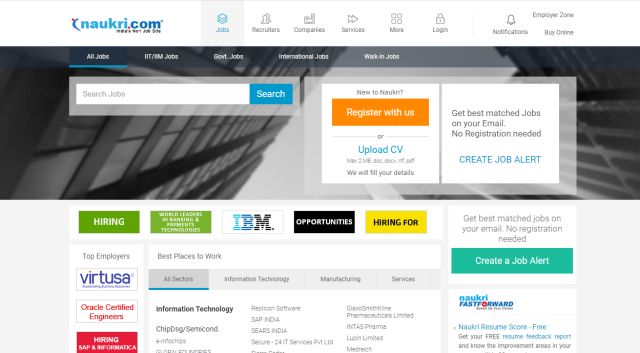
by Editor | May 25, 2021 | Corporate Jobs, Employment, Private Jobs
 By Bhavana Akella,
By Bhavana Akella,
Hong Kong : With automation, Artificial Intelligence (AI) and disruptive technologies increasingly replacing human beings, industry experts on Tuesday called for re-skilling techies for their retention and creating more jobs for future.
“The skills that were required for jobs 20 years ago and the present day are not the same just as the skills that will be required are. So, we have to keep retraining our people,” said International Finance Corporation’s Director, East Asia and Pacific region, Vivek Pathak at a panel discussion during the 11th Asian Financial Forum here.
Addressing a session on “Jobs of the Future – Supporting the Next Generation of Entrepreneurs” at the two-day financial summit that concluded on Tuesday, he said that countries need to create ecosystems to encourage and support start-ups.
“If jobs are being lost in the IT sector due to automation technologies, they are being created in other areas. Governments and public at large should focus on whether techies and people in other professions are skilled enough for the new jobs,” Pathak said.
Countries should also work on making reasonably-priced internet accessible so start-ups and new technologies can grow, said panelist Nicolas Aguzin, the Chairman and Chief Executive Officer for Asia Pacific region at American banking and financial service firm J.P. Morgan Chase.
“Technology has played a critical role in the creation of newer jobs in the past few years,” he said.
Another panellist, Melissa Guzy, the founder and managing partner of Arbor Ventures, a Hong Kong-based venture capital firm, predicted that the future start-ups would be spread across the world, and not centralised in Silicon Valley in the US, which is home to several global technology companies.
“With the restrictions in doing business in the US during President Donald Trump’s regime, the Silicon Valley will continue to dwindle over time, which great as there will be successful startups and entrepreneurs in the rest of the world,” she said.
According to the International Labour Organisation’s projections, at least about 200 million people in the world would be unemployed in 2018.
While jobs in production lines and coal mines etc., would soon be replaced entirely by machines, several new jobs which didn’t exist earlier like data scientists and cybersecurity specialists will also grow, the experts believed.
Organised by the Hong Kong government and the Hong Kong Trade Development Council, the Forum witnessed the participation of around 100 speakers and nearly 3,000 delegates from around 50 countries including China, the US and others.
Some of the key speakers at the Forum included the International Monetary Fund’s (IMF) First Deputy Managing Director of David Lipton, Asian Development Bank President Takehiko Nakao, Asian Infrastructure Investment Bank President and Chairman Jin Liquin among others.
Global economy, emerging financial technology sector in Asia and how it can transform the future of banking, AI and big data opportunities were some of the topics discussed.
(Bhavana Akella is in Hong Kong at the invitation of Hong Kong Trade Development Council. She can be contacted at bhavana.a@ians.in)
—IANS

by Editor | May 25, 2021 | Corporate Jobs, Employment, Opinions
 By Sanjiv Kataria,
By Sanjiv Kataria,
When Infosys founder N.R. Narayana Murthy says the trend of stagnation of starting salaries for software engineers for six to seven years is “worrisome”, we should be nervous. What does it imply for the job market? It’s only a handful of engineering graduates who get six-digit dollar offers.
As you look beyond the top 200 colleges in India, the number of placements is down dramatically over the past few years. Simply put, there are more engineering seats in Indian colleges than students, and there are more graduates than there are jobs.
The demand-supply gap is worse in engineering schools in tier 2 and tier 3 cities. Very few recruiters approach these colleges because they are remotely located, even knowing it would mean missing out on brilliant talent.
The news of a revival of economic indices — manufacturing, core sector expansion, merchandise exports — is buttressed by anecdotal references to Tata Steel and infrastructure major L&T seeing a demand surge from fast-tracked infrastructure projects. The IT sector, which once absorbed engineers like a sponge does water, expects the addition of only 200,000 new jobs in 2018, in the face of a series of protectionist moves being brought in by the US, the biggest market for the $150 billion sunrise sector.
Analysts say new job openings in digital technologies, e-commerce and Artificial Intelligence (AI) in the domestic IT sector can at best add between 50,000 to 100,000 in a country that produces a million engineering graduates each year.
Everyone is worried — students, parents, college managements, including the engineering and management education accrediting body, the All India Council for Technical Education (AICTE). In fact, AICTE has since last year mandated that all engineering colleges should let their students participate in a semester-long internship in industry.
The rapid growth of colleges in engineering and management created an excess capacity in most streams in the past. These colleges now have the flexibility to discontinue streams that don’t attract enough students and start programmes in emerging technologies while using the same infrastructure, much along the lines of broad-banding of manufacturing capacity.
The AICTE is monitoring engineering colleges that are not attracting enough students and where output quality is suspect in terms of learning outcomes. Closure of 300 such colleges is already on the cards. This move will check the oversupply of engineering seats in the country going forward.
Simultaneously, AICTE has reached out to assessment platforms like HireMee to assess engineering students to discover aptitude, logical reasoning, communication and core technical skills. This will help potential employers to access students from lesser-known, difficult-to-reach engineering colleges for suitable job openings. This project for social good can lead to a democratisation of job opportunities as it comes without any cost, either to students or the colleges.
The results of a proctored computer-assisted test by HireMee using a comprehensive assessment framework will present to recruiters different dimensions of personality and behavioural styles.
The government is equally committed to help identify the top 20 higher education institutions of eminence to achieve excellence on a global level and empower them with the wherewithal to compete with their international counterparts.
These institutions will be free to enter academic collaboration with the top 500 institutions in the world, enjoy flexibility, fix course structure, curriculum and syllabi. The scheme will enable Indian students to get world-class education and research facilities within the country.
The education policymakers are equally convinced that the curriculum has to be in tune with the market needs and, therefore, the rate of change of curriculum has to keep pace with the new technology, subjects and skills that are needed today. This is where behavioural assessment can play a big role in checking suitability for jobs.
The recent FICCI, EY and Nasscom report on “Future of Jobs in India” says that by 2022 nine per cent of India’s estimated 600 million work force will be deployed in new job roles that do not exist today. This means that once out of classrooms, the workforce has to imbibe new skills, master new technologies. Those who wish to stay ahead of the curve and stay employable will need to watch the changing technology trends and master them so that they have the first-mover advantage.
The education system, irrespective of the streams they impart education in, will have to introduce among students a new learnability trait that will instill among them a willingness to anticipate and accept change. Once out of the education system and in jobs, they will have to keep alive a strong desire to master new technologies, new skills.
These efforts at rationalising, re-building and strengthening the Indian higher education system offer no shortcuts and could take decades even after we stay focused and committed to achieving global excellence in education.
(Sanjiv Kataria has been NIIT’s brand custodian for nearly two decades. The views expressed are personal. He can be reached at Sanjiv.kataria@gmail.com )
—IANS

by Editor | May 25, 2021 | Employment, Government Jobs

Raghubar Das
Ranchi : Jharkhand Chief Minister Raghubar Das on Thursday announced that 50,000 appointments will be made in the state government by June 2018.
“More than one lakh appointments have been made by the state government in the last two years and another 50,000 appointments will be made by June 2018,” said Raghubar Das addressing a press conference here on completion of three years of his government.
He pointed out that Jharkhand was leading the chart of fast developing states in the country after Gujarat at a growth rate of 8.6 per cent.
“Our government formulated a domicile policy and started making appointments, and 95 per cent jobs were given to local people of the state. For example, the Jharkhand State Staff Selection Commission had recommended 25,787 candidates for the year 2015-17, out of which 24,656, i.e. 95.6 per cent, are local candidates.
“Similarly, most of the local candidates have also got their placements in the district level appointments,” said Das.
The Chief Minister said that over 200 projects had been set up as industrial units through “Momentum Jharkhand” programme at an investment of Rs 6,669.14 crore, and 49,097 direct and 1.47 lakh indirect jobs were created.
Launching “Jhar Madhu” (honey), Raghubar Das said that honey from Jharkhand would be exported to other countries as there was a huge demand for honey in colder regions of the world.
He said that after Prime Minister Narendra Modi gave a call to usher in sweet revolution in the nation, 25,000 farmers had been trained in the state while 600 master trainers were also groomed.
—IANS

by Editor | May 25, 2021 | Corporate Jobs, Employment, Private Jobs

IIT Kharagpur
Kolkata : Offers were made to as many as 1,200 students at the end of phase one of the 2017-18 placement season at IIT Kharagpur — a 15 per cent jump from last year, a statement from the institute said on Thursday.
This placement season started with enrolment of 2,054 students which is the maximum at an individual Indian Institute of Technology.
“This is due to the wide variety of disciplines that are offered by IIT Kharagpur. The 1,200 offers are due to 200 companies that visited during the phase 1,” the statement said.
In a new trend this year, PSUs started visiting the campus during November, which is much before the actual placement session started.
The placements for Undergraduate (UG) students touched the 75 per cent mark which is an improvement of 12 per cent while the placements for Postgraduate (PG) students is at 38 per cent showing an improvement of 14 per cent compared to last year. B.Arch saw a jump of 20 per cent this year compared to the last.
“This year the Career Development Centre (CDC) has initiated a placement drive for PhDs graduating/graduated within two months and this gave a fruitful outcome with 26 PhDs getting placed across reputed teaching and research institutions,” the release added.
—IANS

by Editor | May 25, 2021 | Corporate, Corporate Jobs, Corporate Reports, Employment, Private Jobs
 New Delhi : Online hiring activity registered a 16 per cent growth year-on-year (YoY) during November primarily driven by growth in the non-IT sector, a report by job portal Naukri.com said on Tuesday.
New Delhi : Online hiring activity registered a 16 per cent growth year-on-year (YoY) during November primarily driven by growth in the non-IT sector, a report by job portal Naukri.com said on Tuesday.
According to the survey, the Naukri JobSpeak index for November at 2,113 saw a 16 per cent growth from the corresponding month in 2016, with a broad-based growth in jobs observed in multiple industries.
“The Jobspeak Index has shown 16 per cent YoY growth in November, primarily driven by growth in the non-IT sector,” said V. Suresh, Chief Sales Officer, Naukri.com.
“Good to see sectors viz construction, engineering, auto, industrial products and banking showing significant growth over last year. We can expect the market to further gain momentum and move north in the next few quarters,” he added.
The report pointed out that jobs in construction/engineering industry went up by 46 per cent while jobs in auto sector saw a growth of 39 per cent in the period under review.
During the same period, jobs in heavy machinery and banking sector saw a 30 per cent and 24 per cent growth in hiring, respectively, the report said.
“Jobs in BPO sector went up by 14 per cent in November 2017 when compared to November 2016. The IT software sector also witnessed a seven per cent increase in jobs over the same time period,” it added.
The report noted that while production/maintenance jobs rose by 37 per cent, site engineering jobs saw a 30 per cent growth during the period.
Accounts/finance and marketing/advertising jobs saw a 27 per cent and 26 per cent growth, respectively, while sales jobs recorded 23 per cent rise during November 2017, the survey highlighted.
Of the eight metro cities tracked by the job portal, seven recorded an increase in hiring activity in November.
“The index for Kolkata grew by 51 per cent, while Delhi NCR and Mumbai saw growth of 15 per cent and 16 per cent, respectively, in hiring in the same time period. Bangalore saw a dip of three per cent in jobs,” said the survey.
It added that the positive trend of job growth was also seen in smaller cities.
—IANS





